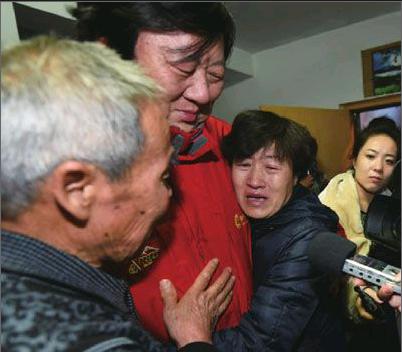THE RIGHT VERDICT
2015-05-22ByLanXinzhen
By+Lan+Xinzhen

At Chinas annual legislative session, the rule of law was a focal topic. Premier Li Keqiang delivered the government work report at the opening meeting of the Third Plenary Session of the 12th National Peoples Congress (NPC) on March 5, announcing that 2015 would be crucial to comprehensively advance law-based governance in the coun- try. Laid out in the document was the fact that China will fully promote the law-based governance of the country; build an innovative, clean, service-oriented government with the rule of law; enhance the governments administrative capacity and credibility.
The report also stated that the Constitution is the fundamental guide upon which every action by the government should be based; governments at all levels and their employees must follow it faithfully. The central leadership must see to it that all violations of laws and regulations are investigated and prosecuted, and that all failures to strictly and impartially enforce the law are rectified.
Comprehensively advancing the rule of law was the focus of the Fourth Plenary Session of the 18th Central Committee of the Communist Party of China (CPC). At the session, it was made clear that a major task of comprehensively advancing law-based governance is to improve the socialist system of laws with Chinese characteristics—at the heart of which is the Constitution—and strengthen the implementation of the Constitution.
Advancing the rule of law is one of the“Four Comprehensives”: to comprehensively establish a moderately prosperous society; deepen reform; advance the rule of law; and strictly govern the CPC.
Enforcing the law impartially and preventing wrongful convictions are the bottom line in establishing and maintaining the rule of law. In the past year, a number of highprofile false convictions have been exposed. Some of the wrongly accused have already been executed and some have suffered years of unjust imprisonment. These cases add a sense of urgency to the advancing of the rule of law.
Zhu Xiaoqing, Vice President of China Law Society and a member of the National Committee of the Chinese Peoples Political Consultative Conference (CPPCC), said that the government is vigorously advancing the rule of law, carrying out judicial reform, and doing its best to prevent wrongful convictions. He said that with the advance of the rule of law, future wrongful convictions will be prevented as much as possible and previous ones will be continuously rectified.

A well-known case
At the Spring Festival of 2015, the parents of Hugjiltu—an ethnically Mongolian Chinese citizen believed to be wrongly executed 18 years ago—grieved as they told the media that if their son were still alive today, he would likely have a child of his own.
In April 1996, during a police crackdown on violent crime that was initiated in the 1990s, then 18-year-old Hugjiltu was convicted of sexually assaulting and choking a woman to death in Hohhot, the capital of north Chinas Inner Mongolia Autonomous Region.
After 48 hours in custody Hugjiltu confessed that he had raped and killed the woman. Police records show that a sample of dandruff found under Hugjiltus fingernails matched that of the victim. Hugjiltu was convicted.
Hugjiltus parents did not believe he could commit such a crime, and they repeatedly pleaded his innocence. Despite this, he was executed in June that year, 61 days after the woman was killed.
In October 2005, a man named Zhao Zhihong confessed that he had raped and murdered 10 women, including the one that Hugjiltu was convicted and executed for allegedly killing.
Hugjiltus case received widespread public attention after Zhao, also a native of Inner Mongolia Autonomous Region, came forward and confessed his guilt. The police double checked the case. In 2011, an officer handling the cases told the media that Zhao was able to describe the attack in detail, and showed the police where it had happened. Zhaos execution was postponed. On February 9, the Intermediate Court of Hohhot ruled that Zhao was the real killer. Hugjiltus parents received compensation of more than 2 million yuan ($323,000).
Hugjiltus case prompted public discussion of, as well as triggering judicial reforms to prevent, forced confessions and other serious miscarriages of justice.
Impetus for reform
Now the peoples congresses, courts and procuratorates across China are reviewing previous cases to hunt down and rectify wrongful convictions. Jiang Bixin, Vice President of the Supreme Peoples Court(SPC), said that once any wrongful conviction is found, it must be put right.
On March 12, the SPC and Supreme Peoples Procuratorate (SPP) released their 2014 work reports, revealing that at least five significant wrongful conviction cases were overturned last year.
The SPCs report in particular pointed out that last year Fujian High Peoples Cour ruled that Nian Bin, a resident of Pingtan County was not guilty because “evidence was not sufficient.” Before that, Nian had been sentenced to death four times by courts in Fujian Province.
Nian was accused of poisoning the young son and daughter of his former neighbor Ding Yunxia. On the evening of July 27, 2006, Ding and her three children had dinner together with their landlord Chen Yanjiao and Chens daughter. That evening, Dings two children and Chens daughter showed symptoms of poisoning and were sent to hospital. The next morning, Dings two children died. Police found poison on the cooking utensils. Nian was arrested as a suspect because Ding said that Nian held a grudge against her because she operated a store that competed with his.
In September 2014, the police began to reinvestigate the case. The perpetrator is yet to be identified.
He Jiahong, a professor with Renmin University of China, said he used to blame law enforcement for wrongful convictions, yet after in-depth study, he found that the issue was not so simple.
“If only an extremely small number of cruel and unethical people deliberately created wrongful convictions, then that is their faults. But if some highly regarded law enforcement personnel also make mistakes, and the mistakes are duplicated again elsewhere, then we must conclude that the criminal justice system has defects,” he said.
After an analysis of the wrongly judged cases, he said that setting deadlines for cracking cases was one source of the issue. In China, rewards and promotions are pegged to case clearance rates. While this incentive system can motivate people to investigate cases, it can also prompt a desire for fast convictions at the expense of judicial impartiality, He said.
Another cause is the investigation model that puts collecting testimonies before collecting evidence. After a case is reported, law enforcement officers usually do everything they can to capture the suspect, try their best to get his or her confession and then collect any necessary evidence. This will easily lead to inquisition torture, another important reason for wrongly judged cases.
Chen Ruihua, a law professor with Peking University, said that some law enforcement organs failed to follow the principle a criminal suspect being considered innocent until they can be proven guilty.
The police, procuratorates and courts should perform their functions in handling criminal cases separately, with investigation left to the police, prosecution left to the procuratorates and adjudicating cases left to the courts.
Yet proper procedures are sometimes not followed. For instance, courts often send other people to investigate the case together with the police and the procuratorates. A benefit of joint investigation is that a case can be cracked sooner, but the drawback is that it can give rise to erroneous judgments.
Closing loopholes
In February, the Ministry of Public Security (MPS), SPP and SPC, released more than 200 reform measures to advance the rule of law.
Those adopted by the MPS cover seven aspects of public security work, including capacity building for the police. It is a comprehensive reform plan. The SPP spelled out 42 key tasks to improve the procuratorate system, with a focus on deep-seated problems undermining judicial justice. The SPC introduced 65 court reform measures in seven areas including restructuring courts. For instance, under the new rules, defendants will no longer be brought to trial in prison jumpsuits to prevent bias. The SPC has set a road map and time line for the implementation of these measures.
Rectifying wrongly judged cases has been included in the reform plans of the law enforcement, procuratorate and court systems. Both the MPS and SPP decided to set up a mechanism to retroactively hold those accountable for such rulings. The SPP and SPC also plan to respectively set up a disciplinary committee for procuratorates and judges, to punish violators of law and disciplines while ensuring their rights to defend themselves.
The SPC will strengthen oversight over the use of judicial and investigative measures that restrict personal freedom and set up a trialcentered litigation system.
The reform plan also emphasizes the principles of “judgment by evidence” and“innocent until proven guilty.” It states that any illegally obtained evidence must be excluded from trials.
One of the main goals of the reform is to create a more independent legal system. The reform plan stipulates that if officials interfere with cases, courts should record this information and archive it.
Breaking the barriers down
Despite policy measures to rectify wrongful conviction cases, reform is still faced with obstacles, said Yan Jianguo, Director of the Legal Affairs Committee of the Central Committee of Jiusan Society, one of the eight other political parties in China besides the CPC. Yan Jianguo said that these obstacles should be removed as soon as possible to advance the rule of law.
Strengthening oversight and accountability would go a long way, suggested Li Rong, a member of the CPPCC National Committee.
“A law-based government should be a responsible one. Progress in advancing the rule of law should be an important measure of officialsjob performance, and be linked with their appointment and promotion,” Li said.
Li said that the NPC and the CPPCC should strengthen supervision over the governments policy-making, administration and law enforcement procedures, and hold officials retrospectively for their errors. He said that officials should be severely punished for dereliction of public duty or breaking the law.
The biggest difficulty in rectifying wrongful conviction cases lies in the police. For instance, after Zhao confessed in 2005, Hugjiltu was not been declared innocent until nine years later in 2014. The case was obstructed by Feng Zhiming, head of the Public Security Bureau in Xincheng District of Hohhot when Hugjiltu was detained. Feng was later promoted to deputy head of the Hohhot Public Security Bureau. Feng is under investigation for derelictions of duty, extorting confession through torture and bribery.
Cai Dafeng, a CPPCC National Committee member, believed that to prevent repeats of cases such as Hugjiltus, investigation procedures need to be improved first. He proposed a law to govern the work of the police. He said it is important to improve the ethical standards and professional qualifications of law enforcement.
